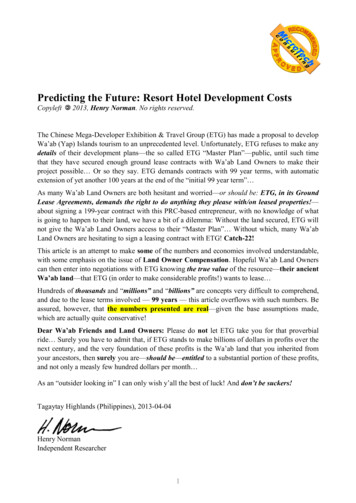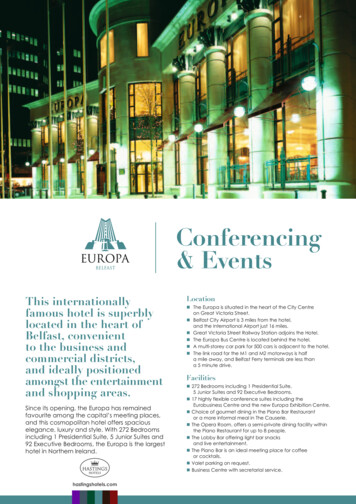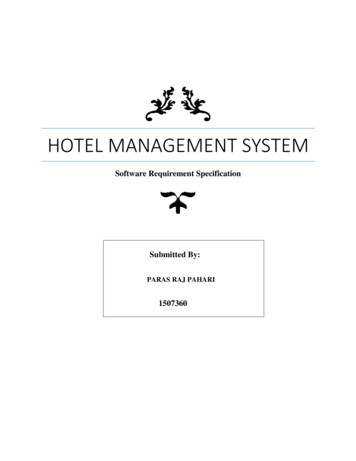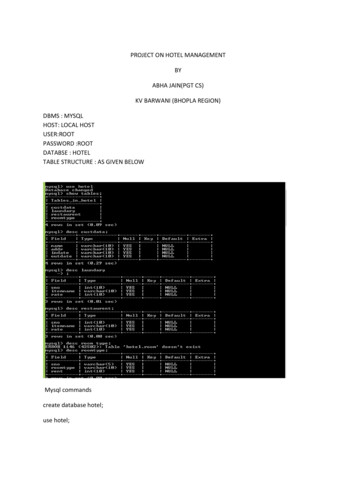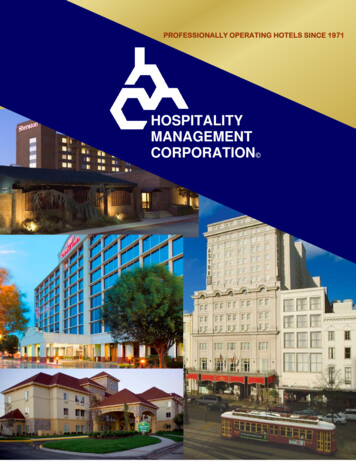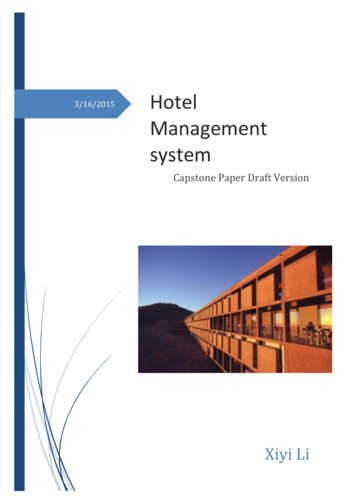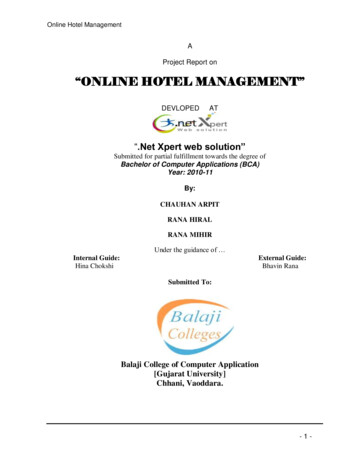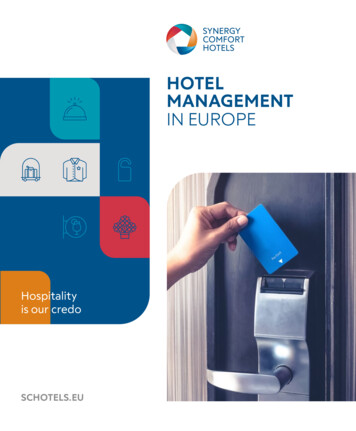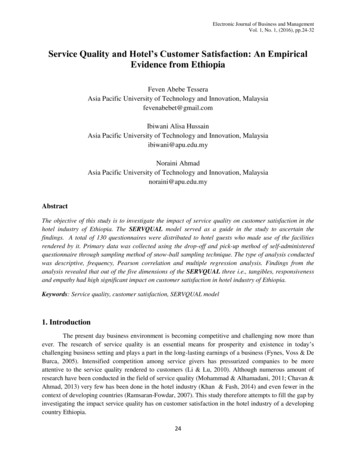
Transcription
Electronic Journal of Business and ManagementVol. 1, No. 1, (2016), pp.24-32Service Quality and Hotel’s Customer Satisfaction: An EmpiricalEvidence from EthiopiaFeven Abebe TesseraAsia Pacific University of Technology and Innovation, Malaysiafevenabebet@gmail.comIbiwani Alisa HussainAsia Pacific University of Technology and Innovation, Malaysiaibiwani@apu.edu.myNoraini AhmadAsia Pacific University of Technology and Innovation, Malaysianoraini@apu.edu.myAbstractThe objective of this study is to investigate the impact of service quality on customer satisfaction in thehotel industry of Ethiopia. The SERVQUAL model served as a guide in the study to ascertain thefindings. A total of 130 questionnaires were distributed to hotel guests who made use of the facilitiesrendered by it. Primary data was collected using the drop-off and pick-up method of self-administeredquestionnaire through sampling method of snow-ball sampling technique. The type of analysis conductedwas descriptive, frequency, Pearson correlation and multiple regression analysis. Findings from theanalysis revealed that out of the five dimensions of the SERVQUAL three i.e., tangibles, responsivenessand empathy had high significant impact on customer satisfaction in hotel industry of Ethiopia.Keywords: Service quality, customer satisfaction, SERVQUAL model1. IntroductionThe present day business environment is becoming competitive and challenging now more thanever. The research of service quality is an essential means for prosperity and existence in today’schallenging business setting and plays a part in the long-lasting earnings of a business (Fynes, Voss & DeBurca, 2005). Intensified competition among service givers has pressurized companies to be moreattentive to the service quality rendered to customers (Li & Lu, 2010). Although numerous amount ofresearch have been conducted in the field of service quality (Mohammad & Alhamadani, 2011; Chavan &Ahmad, 2013) very few has been done in the hotel industry (Khan & Fash, 2014) and even fewer in thecontext of developing countries (Ramsaran-Fowdar, 2007). This study therefore attempts to fill the gap byinvestigating the impact service quality has on customer satisfaction in the hotel industry of a developingcountry Ethiopia.24
Electronic Journal of Business and ManagementVol. 1, No. 1, (2016), pp.24-32The study will assist hotels to improve the overall level of customer satisfaction and it will also be usefulto governments and commercial sectors to which the hotel and tourism industry is of much significance.2. Literature Review2.1 Service QualityService quality has been regarded as a major factor for the achievement of organizations due tothe close relation it has with customer satisfaction particularly in the service industry (Gilbert &Veloutsou, 2006). In addition to it being a preceding factor to acquire positive buying behaviors, it is alsoviewed as a vital component to the hotel industry’s achievement and success (Min, Min & Chung, 2002).Service quality has been believed to have direct impact on customer satisfaction, recurrence of buyingbehavior and security of a company’s profit in the long-run (Wilkins, Meerilees & Herington, 2007). Forthe quality of service to be better, it is important to continuously communicate with employees andanalyze their service encounter (Prayuhda & Harsanto, 2014). According to Parasuraman et al. (1988),service quality can be defined as the capacity of the company to conform with or outdo customerexpectations. It is the deviation between the customer’s expectation of service and perceived service(Zeithaml, Parasuraman, Berry, 1990). Good quality of service will have a positive influence onprofitability by elevating the customer base of a firm (Rauch et al., 2015).2.2 Customer SatisfactionCustomer satisfaction is a crucial element in service quality assessment because the higher thecustomer satisfaction the higher the performance of a business (Morgan, Anderson & Mittal, 2005). It canbe guaranteed via a product or service that is of good quality (Gunarathne, 2014). Clients’ prior encounterof content or discontent is essential due to its impact on the anticipation of a person’s purchase behaviorthe next time (Gutierrez & Uribe, 2011). Thus, most literatures in the hotel sector consider customersatisfaction as an essential constituent of the hotel sector’s value position to customer (Maghzi et al.,2011). Customer satisfaction is defined as “the individual’s perception of the performance of the productor service in relation to his or her expectations” (Schiffman & Kanuk, 2004). It is a business doctrine thatis inclined towards generating worth to customers, predicting and governing their assumption, andindicating capability and authority to fulfil their demands and requirements (Delgado-Ballester, 2004).Customer satisfaction is an after use assessment regarding a given product or service (Gundersen, Heide& Olsson, 1996). It is the doctrine that emphasizes the significance of making worth for customers,predicting and handling their presumptions and manifesting the capability and duty to meet theirrequirements (Dominici & Guzzo, 2010).2.3 The SERVQUAL ModelParasuraman et al. (1988) released a widely distinguished five set of service quality dimension(SERVQUAL). This service quality dimension is amongst the frequently applied and quoted elements inthe writing works of service quality (Othman & Owen, 2001). These dimensions namely tangibility,25
Electronic Journal of Business and ManagementVol. 1, No. 1, (2016), pp.24-32reliability, responsiveness, assurance and empathy have been applied in many service firms to measurequality performance. Tangibles relate to material characteristics like gadgets, equipment and how staffscarry themselves (Seo, 2012).This component deals with the existence of the physical facilities and theperceived quality of the materials, personnel and equipment used by the service giver (Kandampully,2007). Reliability is defined as the dependability, consistency and accuracy with which the service isperformed by the provider (Kandampully, 2007). It is about the business keeping its word. It is “theability to perform the promised service dependably and accurately” or delivering its promises” (Zeithamlet al., 2006 p.117).Responsiveness relates to the zeal in the service personnel to serve customers in a well-timed,effective fashion and it incorporates elements like cooperativeness, kindliness and tenderness of theservice stuff (Kandampully, 2007). It is the desire of the service giver to be supportive and quick inrendering the service (Prayuhda & Harsanto, 2014). Assurance is the extent to which the servicepersonnel stimulates faith and credence among the customers of the firm (Kandampully, 2007). It is the“employees” knowledge and courtesy and the service provider’s ability to inspire trust and confidence”(Zeithaml et al., 2006 p.119). If the customers don’t find the service and staff of the company pleasant,the chances of them returning back will be slim (Delgado-Ballester, 2004).Empathy has to do with the “caring and individualized attention” granted to customers besides thedegree of understanding personnel manifests in relation to customer needs (Kandampully, 2007). It hasbeen ascertained to be more desirable and significant in magnifying the quality of service in industrieswhere establishing relationships with customers and clients guarantees survival (Andaleeb & Conway,2006). The likelihood of clients returning back to a company provided they were given special care andattention is very high (Delgado-Ballester, 2004).2.4 The hotel industry in EthiopiaEthiopia is amongst the African countries that is endowed with the biggest amount of UNESCOWorld Heritage Sites in Africa. There are a total of 8 sites dispersed throughout the country. This gives itthe advantage of building up itself as a home for tourists. Ethiopia’s government has emphasized on theexpansion of tourism in its development program, PASDEP (Plan for Accelerated and SustainedDevelopment to End Poverty) to hone the prevailing tourism capital as an impelling cause of financialexpansion for the entire country. In addition, the late Prime Minister, Meles Zenawi, has stated how big apart tourism expansion plays in lessening penury (Embassy of Japan in Ethiopia, 2008).Ethiopia is strategically regarded as an essential country in the Horn of Africa for a lot ofcountries. It is a place where most of the international meetings, conventions and gatherings takes place.This calls for housings and lodgings at a universal quality; and this will continue to grow in the futurebecause huge number of global companies have been endlessly fortifying their establishments andexpanding their workforce in Ethiopia (Embassy of Japan in Ethiopia, 2008). New international,franchised and local hotels, restaurants, nightclubs and bars have been inaugurated and functional.International brands and franchises from America, Europe and China and locally standardized hotels areconsidered to promote the hospitality industry (Aschale, 2013).26
Electronic Journal of Business and ManagementVol. 1, No. 1, (2016), pp.24-32The hotel industry has recently become a fast growing industry. The sector incorporates a numberof services like accommodation, restaurants, cafes, conference halls and gyms. Records validate that thegrowth of the hotel sector is directly associated with touring. Likewise, the expansion of the hotelindustry in Ethiopia is linked to the growing number of both native and nonnative tourists and travelers(G/Egziabher, 2015). The demand for the industry particularly in a developing country like Ethiopia isrelated to the tourism sector since the customers of hotels mostly originate from tourists worldwide(Mitiku, 2015). A significant effect has been observed in the growth of the country’s foreign relationsespecially at the time when Menelik II was ruling; by instilling the idea of modernization and bringing inforeign technology and organizations among which hotel is one of them. Expansion of up to date hotels inEthiopia dates back to the 19th century (G/Egziabher, 2015). Etege Taitu Hotel which was inaugurated in1898 (E.C.) at the hub of the city, Piazza was the first hotel.Proceeding 142 new hotel developmental projects in Sub-Saharan Africa (SSA) in 2014, Ethiopiais rated amongst the top 10 largest markets for international hotel chain developments. The hotel industryhas been creating a direct economic impact towards countries. In Ethiopia, the industry’s contribution toGDP was 4.2% in 2013 and it has rose by 4.5% in 2014 and this figure is predicted to rise by 5% in 2024(Africa Business, 2015).3. MethodologyThe objective of the study is to determine the impact of service quality on customer satisfaction inthe hotel industry of Ethiopia. Primary data was gathered primarily through the use of surveyquestionnaire. A total of 150 questionnaires were distributed to various hotels on order to be filled out byhotel guests, and out of the total 150 questionnaires 130 were positive and complete which resulted in86.87% response rate. The selected sample represented a balanced mix of various demographic factorsGender, age, marital status, nationality, educational qualification, occupation and visit purpose.In order to ensure the confidentiality of the hotel customers the drop-off and pick-up method ofself-administered questionnaire was used. The independent variable in this study was service qualitywhile the dependent variable was customer satisfaction. The SERVQUAL Model was used in order tomeasure service quality which incorporates 5 dimensions namely tangibility, reliability, responsiveness,assurance and empathy. 5 items for each independent variable and 8 items for the dependent variablewere used. A 5 point interval Likert scale was used for all the variables with 1 denoting strongly disagreeand 5 strongly agree. The data collected was analyzed by making use of SPSS and descriptive analysislike frequency, mean, standard deviation and inferential statistics like the Pearson’s correlation andmultiple regression were used.4. FindingsDemographically, out of a total of 130 respondents 50% were male and 50% were female.Regarding the distribution of the age range of respondents, majority of the respondents (31.5%) fall underthe category of 36-45 years of age followed by 26.9% of the respondents being under the category of 2635 years of age. With regards to nationality, while 50.8% of the respondents were foreigners 49.2% wereEthiopians. In addition to that, majority of the respondents (53.8%) were married while 39.2% werecurrently single. Further, while 40.8% of the respondents have acquired their Bachelor’s degree 27.7% ofthe respondents are with Master’s degree and above. Due to the good educational qualification that most27
Electronic Journal of Business and ManagementVol. 1, No. 1, (2016), pp.24-32of the respondents have acquired majority of them (56.2%) are also employed and 28.5% are selfemployed.Table 1: Result of descriptive analysis of the dependent variable and independent variablesVariablesCustomer ranceEmpathyMean3.573.563.613.723.523.60Standard Deviation1.051.081.110.981.091.1Reliability test was then conducted to ensure the goodness of the variables. The results obtainedfrom the reliability test showed that all the variables had a Cronbach value of greater than 0.9 whichaccording to a research conducted by George & Mallrey (2003) proves that the data are commendable anddeemed to be good. Furthermore, Pearson’s correlation analysis was conducted in order to examinesignificant relationship between two quantitative and continuous variables. From the results obtained itcan be observed that all the independent variables are commendably correlated with the dependentvariable as all of the independent variables are above 80% able to explain the dependent variablecustomer satisfaction. Of all the independent variables, Assurance had the highest correlation (0.863) withthe dependent variable. Table 2 shows result obtained from the Pearson’s Correlation analysis.Table 2: Pearson’s Correlation AnalysisDV CSPearson CorrelationSig. (2-tailed)IV1 TNPearson CorrelationSig. (2-tailed)IV2 RelNPearson CorrelationSig. (2-tailed)IV3 ResNPearson CorrelationSig. (2-tailed)IV4 AsuNPearson CorrelationSig. (2-tailed)IV5 EmpNPearson CorrelationSig. (2-tailed)NDV CS1IV1 T.843**IV2 Rel.850**IV3 Res.861**IV4 Asu.863**IV5 30.816**28130.911**.000130.828**130.865**130
Electronic Journal of Business and ManagementVol. 1, No. 1, (2016), pp.24-32Table 3: Model SummaryModelRR SquareAdjusted R Square1.914a.835.829a. Predictors: (Constant), IV5 Emp, IV1 T, IV3 Res, IV2 Rel, IV4 AsuStd. Error of the Estimate.45472Model summary shows the predicted variances of the variables. From the above model summary,it can be observed that R represents multiple correlation coefficient which has a value of 0.914 stating ahigh correlation among all the variables. On the other hand, Adjusted R Square shows the value of 0.829which predicts the variables with over 82.9% variance. It implies that the variables have high impactamong each other.5. DiscussionThe results from the study indicated that 3 out of the 5 independent variables have significantimpact on the dependent variable customer satisfaction, i.e., tangibility, responsiveness and assurance.Tangibility is about creating a good image in the hearts and minds of customers the first time. A goodfirst impression will result in customers wanting to use the other facilities of the hotels. In contrary, ifthey are not pleased with what they see the first time, it is unlikely that they will want to stay at the hotelto make use of the other facilities that the hotel provides. So, tangibility plays an important role insatisfying customers. This study proves that the Ethiopian customers feel the same about the tangibilitycomponent being important in the way they measure their satisfaction. Responsiveness is the otherdimension that customers deem important. The findings from the study revealed that the reason is becauseguests in Ethiopia emphasized value to the employees of the hotel providing prompt help, being able tocater to guests needs, rendering quick check-in and check-out facilities, their ability to quickly correctmistakes and give special attention to their guests (any citation to support the statement). This indicatesthat employees’ taking action and giving immediate response to any kind of problem the customer facesplays an important role in satisfying the customer because clients praise easy and hurdle free stay by allmeans.Assurance was found to have the highest impact on customer satisfaction. The Ethiopiancustomers get satisfaction from employees’ behavior instilling confidence towards them, their knowledgeand skills and their polite behavior. The hotel creating a safe and secured feeling is another factor theydeem important. Assurance relates to the staff of the hotel. It is whether or not they are skilled and canobtain the trust and credence of clients and also about their problem solving skills. If clients are not incontent with the employees, there is a high probability that they will not come back to do more businesswith the company (Delgado & Ballester, 2004). Guests get delighted when they get solutions to theirproblems easily. Employees’ problem solving skills fall under the assurance dimension. Hence, the highcorrelation between assurance and customer satisfaction could also be explained by this fact.Based on the study conducted by Torres & Kline (2013), employees being well educated and theright implementation of their duties is yet another factor guests deem crucial. This relates to the skills andcompetency they possess and proficiency in the implementation of important work duties. Employees’professionalism is one of the most frequently stated factors in what customers consider important whenthey measure their satisfaction. These factors have led to the high correlation between assurance andcustomer satisfaction.29
Electronic Journal of Business and ManagementVol. 1, No. 1, (2016), pp.24-326. ConclusionThe intent of any hotel is to create a customer. By constantly delivering high levels of servicequality, customer retention will take place which will in turn result in a loyal customer in the long haul.Overlooking the power of customer satisfaction especially their needs and requirements could wreck thepower of customer retention and loyalty. Therefore, hotel managements’ biggest challenge lies not justbehind attracting customers but also on recognizing customer satisfaction individually. Customers havedifferent expectations and they are different in the way they perceive things. No two customers perceivethe same service in the same way and nor do they have the same needs. Thus, there is no one best way ofimproving service quality in the hotel industry. It all depends on the country where the hotel is locatedand the culture of the people. Because culture influences the way people perceive things, it is best to studythe culture of the people prior to commencing a hotel business and render the service exactly in the waythey find it fit and satisfying.ReferencesAfrica Business, (2015). Hotel industry in Africa « African Business Environment. [Online]Available at: y-in-africa/ [Accessed 10Nov. 2015].Andaleeb, S. and Conway, C. (2006). Customer satisfaction in the restaurant industry: anexamination of the transaction specific model. Journal of Services Marketing, 20(1),pp.3-11.Delgado‐Ballester, E. (2004). Applicability of a brand trust scale across product categories.European Journal of Marketing, 38(5/6), pp.573-592.Dominici, G. and Guzzo, R. (2010). Customer Satisfaction in the Hotel Industry: A Case Studyfrom Sicily. IJMS, 2(2).Embassy of Japan in Ethiopia. (2008). A series of Studies on Industries in Ethiopia. [online]Available at: http://www.et.emb-japan.go.jp/Eco Research E.pdf. [Accessed 7 Jan.2016].Fynes, B., Voss, C. and De Búrca, S. (2005). The impact of supply chain relationship quality onquality performance. International Journal of Production Economics, 96(3), pp.339-354.G/Egziabher, A. (2015). Service Quality and Customer Satisfaction in Hotel Industry: The Caseof Three Star Hotels in Addis Ababa, Ethiopia. Post Graduate. Addis Ababa University.George, D., & Mallery, P. (2003). SPSS for Windows step by step: A simple guide andreference. 11.0 update (4th ed.). Boston: Allyn & BaconGilbert, G. and Veloutsou, C. (2006). A cross‐industry comparison of customer satisfaction.Journal of Services Marketing, 20(5), pp.298-308.Gunarathne, U. (2014). Relationship between Service Quality and Customer Satisfaction in Sri30
Electronic Journal of Business and ManagementVol. 1, No. 1, (2016), pp.24-32Lankan Hotel Industry. International Journal of Scientific and Research Publications,4(11).Gundersen, M., Heide, M. and Olsson, U. (1996). Hotel Guest Satisfaction among BusinessTravelers: What Are the Important Factors? Cornell Hotel and Restaurant AdministrationQuarterly, 37(2), pp.72-81.Gutierrez, S. and Uribe, G. (2011). Customer satisfaction in the hospitality industry inGuadalajara, Mexico. Advances in Competitiveness Research, 19(4), pp.17-30.Kandampully, J. (2007). Services management. Upper Saddle River, N.J.: Pearson Prentice Hall.Khan, M. and Fasih, M. (2014). Impact of Service Quality on Customer Satisfaction andCustomer Loyalty: Evidence from Banking Sector. Pakistan Journal of Commerce at:http://www.jespk.net/publications/180.pdf [Accessed 1 Nov. 2015].Li, W. and Lu, Y. (2010). How Service Climate Impacts on Service Performance: Evidence fromChina Hotel Industry. 2010 International Conference on Management and ServiceScience.Maghzi, A., Abbaspour, B., Eskandarian, M. and Hamid, A. (2011). Brand Trust in HotelIndustry: Influence of Service Quality and Customer Satisfaction. InternationalConference on Business, Economics and Tourism Management, 24.Min, H., Min, H. and Chung, K. (2002). Dynamic benchmarking of hotel service quality. Journalof Services Marketing, 16(4), pp.302-321.Mitiku, H. (2015). The Role of Private Sector in the Development of the Tourism Industry: TheCase of Privately Owned Hotels in Addis Ababa. Postgraduate. Addis Ababa University.Mohammad, A. and Alhamadani, S. (2011). Service Quality Perspectives and CustomerSatisfaction in Commercial Banks Working in Jordan. Middle Eastern Finance andEconomics, 14.Morgan, N., Anderson, E. and Mittal, V. (2005). Understanding Firms' Customer SatisfactionInformation Usage. Journal of Marketing, 69(3), pp.131-151.Othman, A. and Owen, L. (2001). Adopting and measuring customer service quality (SQ) inIslamic banks: a case study in Kuwait finance house. International Journal of IslamicFinancial Services, 3(1), pp.1-26.Prayudha, A. and Harsanto, B. (2014). Measuring service quality in Hotel X Bandung. 2014International Symposium on Technology Management and Emerging TechnologiesRamsaran-Fowdar, R. (2007). Developing a service quality questionnaire for the hotel industry inMauritius. Journal of Vacation Marketing, 13(1), pp.19-27.Seo, Y. (2012). Cultural Impact on Customer Satisfaction and Service Quality Evaluation inHotels. Postgraduate. University of Nevada, Las Vegas.31
Electronic Journal of Business and ManagementVol. 1, No. 1, (2016), pp.24-32Torres, E. and Kline, S. (2013). From customer satisfaction to customer delight. InternationalJournal of Contemporary Hospitality Management, 25(5), pp.642-659.Wilkins, H., Merrilees, B. and Herington, C. (2007). Towards an understanding of total servicequality in hotels. International Journal of Hospitality Management, 26(4), pp.840-853.Zeithaml, Bitner, M., Gremler, D. and A, V. (2006). Services Marketing: Integrating CustomerFocus across the Firm. 4th ed. Singapore: McGraw-Hill, pp.117, 119.Zeithaml, V., Parasuraman, A. and Berry, L. (1990). Delivering quality service. New York: FreePress.32
Parasuraman et al. (1988) released a widely distinguished five set of service quality dimension (SERVQUAL). This service quality dimension is amongst the frequently applied and quoted elements in the writing works of service quality (Othman & Owen, 2001). These dimensions namely tangibility,
